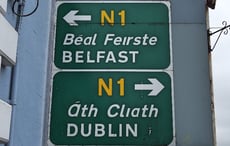Trocaire, the Irish aid agency, has expressed concern about the sincerity of Ireland's commitment to overseas aid in a week when senior Irish government ministers including the Taoiseach (Prime Minister) Brian Cowen arrive in New York to unveil their new Hunger Task Force report at the United Nations.
Trocaire director Justin Kilcullen told the Irish Voice, "I think this week's gathering is particularly important because it's the last chance the UN has to get the Millennium Development Goals, a set of eight goals designed to reduce worldwide poverty by 2015, back on track. We will be specifically asking the Irish government to outline its commitment to achieving the aid targets in spite of the economic downturn at home, and in advance of the October 14 Irish budget."
Kilcullen said that it was already recognized in the Sub Saharan region of Africa that the Millennium Development Goals will not be reached on target, but if substantial progress were made toward them it would still be a significant achievement.
"The problem is that at gatherings like this is that you get a lot of fine words, but the resources are rarely put in place to back them up,' he added.
Kilcullen admitted that from the Irish perspective the economy at home is in a very bad way, with a €5 billion deficit in terms of the revenue that was expected, so his organization now feared the worst. Nonetheless, he said he believed that Ireland still had a duty to fulfill it promise.
Said Kilcullen, "We have put it to the taoiseach and to the minister for foreign affairs that Ireland's credibility in terms of our commitment to the developing world is on the line. If we are going to launch a Hunger Task Force report here on Thursday proclaiming Ireland's commitment to combating world hunger, and at the same time cut our developing budget, that would be obviously inconsistent. It would lack all credibility."
Trocaire are putting pressure on the Irish government by insisting they can't produce a Hunger Task Force report without putting the money behind it to deliver on it.
Kilcullen reminded the press that Cowen has said - echoing former Taoiseach Bertie Ahern - that this is an area of overseas development work that Ireland would focus on because of its unique history of famine and its understanding of it.
Said Kilcullen, "Historians have argued that Ireland didn't have a famine, it had a hunger. Because at the time the peasantry didn't have access to food the country was exporting food by the hundreds of tons. Fine quality crops were all exported.
"So the problem then was a political one. It was about a British government that took no responsibility for its people. The same situation prevails in the world today. Because there has not been the political will to put their resources into this."
The initial commitment given by the Irish government at the UN in 2000 was broken Kilcullen said, and in July the government announced cutbacks to the tune of €450 million because of the economic downturn - 10 percent of that amount was cut from the foreign aid budget.




Comments